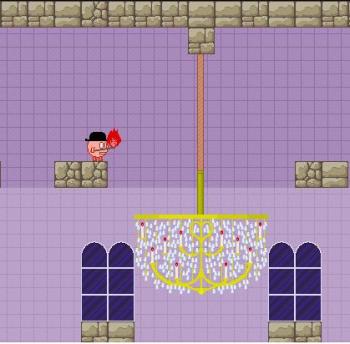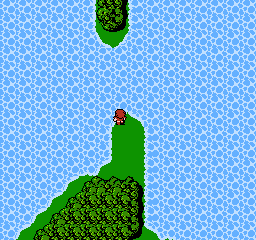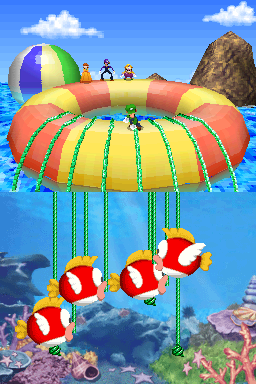I was at first wishing to do something a little more
joyful, but then I decided to go the other way. I assume that if you read this
blog, you’re interested in video games, right? I mean, you’re probably a fan of
Nintendo and whatnot, and maybe you also know a lot about the other consoles in
the great console battle. That’s what I assume, anyway. And so, it is likely
that you’ve run into a number of trends in game development, or in gaming in
general, that you simply cannot stand. You see a game use any of these and you
just go “Urghhhhhh… again?” Or worse even, what was up to that point a good
game becomes intolerable in your eyes. These are the gaming clichés that have
worn out their welcome, the missions that annoy the players rather than
encourage then, the characters who serve no purpose… we’ve all run into
stuff like that. The good games may contain a few instances of these gaming
tropes, the bad games may contain dozens of them.
Obviously, my gaming experience will taint this Top
12, so if you’ve been reading this blog for a while, you might know a few of my
pet peeves. I will try to remove most tropes related to storytelling, as those
can be found in just about any story, beyond the realm of video games. However,
everything else is fair game; game development, gaming communities, trends,
gameplay elements… I’ll try to keep the rage to a minimum. But I’m sure you’ll
agree with me on more than a few elements on this list. Hell, you could
basically consider this list “12 common complaints directed at video games,
that I’ve seen, and that annoy me, ranked from what I consider the least bad to what I consider the worst”. Obviously that title would have been too long for Blogger. Remember
that these are my opinions, you’re free to disagree; Heck, if you’ve got
something in video games that really annoys you, and it’s not on the list, feel
free to discuss it in the comments! In fact, please do, I want to hear what irks you in gaming today. Alright, let’s get this started.
12. Rubber-band AI
 |
| How it is supposed to work. |
11. Escort missions
 |
| Well, exc-...... You know what, you're not even worth me doing that joke. |
 Makes you wish you could just shoot an arrow in that NPC’s face. And you have
to move your little ass around killing enemies left and right for the ingrate
jerk princess Ruto or for the stupid Parallel Bird. Advice to future game
developers, if you create an escort mission, you damn better know what you’re
doing. Avoid he common escort mission traps. Do not attempt this if you don’t have the talent to do it correctly.
Makes you wish you could just shoot an arrow in that NPC’s face. And you have
to move your little ass around killing enemies left and right for the ingrate
jerk princess Ruto or for the stupid Parallel Bird. Advice to future game
developers, if you create an escort mission, you damn better know what you’re
doing. Avoid he common escort mission traps. Do not attempt this if you don’t have the talent to do it correctly.
10. Disappointing final level/Boring level designs in
general
Games take time to create. Hundreds work on a single
game at once, and even with that many people, sometimes creativity runs out. It
happens. There is also the mindset that not all gamers will play all the way
through a game, thus some developers will put less effort in the later levels.
Even though that’s the worst leap in logic on a developing standpoint. Just
because less people will get to the end doesn’t mean the end has to suck. And
yet, many players feel disappointed when they reach the final level, or the
final world, or the final dungeon, or the final whatever, because it’s just not
up to par with what came before. This is an aesthetic problem, but it can go
beyond that: When you add level design
to this and, suddenly, even the platforming becomes tedious, either too
difficult or just plain boring. Both extremes have been seen. And that’s of
course when the ugly aesthetics aren’t making up most of the game in the first
place. When it comes to level design, some games… just don’t have it. Maybe they don’t know how to give every world a new look, a new feel. In a perfect
world, games would stay creative till the end, but this isn’t a perfect world. This is an entirely subjective point, so your examples may differ greatly from mine, but I can think of a few cases: Castle Oblivion in Kingdom Hearts re:coded, or Bowser's castle in New Super Mario Bros. Wii.
9. Too brown, too grey, too dark
 Another point of criticism regarding aesthetics: The
idea that, in order to be realistic, a game has to be brown, gray or dark. The
webcomic VGCats coined the phrase “Real is brown” to refer to this phenomenon
that plagues an awful lot of first-person shooters on the Sony and Microsoft
consoles. And the PC games too, of course. Some Nintendo games also suffer from
this, though I don’t see it as often. That’s of course when the game doesn’t
also go the “dark” route. You know, darkness works in many games, especially
the horror genre. It must not hinder the gameplay experience, however. Nobody
likes to wander around in the dark wondering where to go, what may be ahead,
what their toes might smash into if they step forward. Story of my life, my
poor toe, again this morning it bumped on something.
Another point of criticism regarding aesthetics: The
idea that, in order to be realistic, a game has to be brown, gray or dark. The
webcomic VGCats coined the phrase “Real is brown” to refer to this phenomenon
that plagues an awful lot of first-person shooters on the Sony and Microsoft
consoles. And the PC games too, of course. Some Nintendo games also suffer from
this, though I don’t see it as often. That’s of course when the game doesn’t
also go the “dark” route. You know, darkness works in many games, especially
the horror genre. It must not hinder the gameplay experience, however. Nobody
likes to wander around in the dark wondering where to go, what may be ahead,
what their toes might smash into if they step forward. Story of my life, my
poor toe, again this morning it bumped on something.“Real” doesn’t have to be the same boring “gritty” colors. Real can be beautiful. Don’t make your game look like crap with the argument that it’s meant to look more realistic. That’s a bogus argument. There are some technical reasons to go for those colors, due to lighting and whatnot, but realism is not a good argument. My world isn’t brown. The wall behind me is some kind of ugly hospital green, but it sure isn’t brown.
8. Lack of balance
This one’s for all the competitors out there. I am not
much on the competitive scene of games, but sometimes a game’s lack of balance
can be felt even in single-player mode or between friends. Most games with
competitive scenes have seen this happen: The Yu-Gi-Oh! card game had to create
archetypes just to counter the overused decks that won all the time, with recently the Performapal/Performage archetype destroying everything in its way. Smogon’s
ban lists have to be consistently updated as the Pokémon series changes and
evolves; the Mega Evolutions, for the most part, were integrated pretty well,
but then the PvP was flooded with Mega Kangaskhan. I can’t speak for most games
on the Playstation, Xbox or PC competitive games out there, but there is one other example of a horrible balance I can think of: Super Smash Bros. for the
Nintendo 3DS. I played that game. I… am not a fan of it. I’ve barely even
played in Multiplayer mode, but I am convinced that I would despise it when items are turned on. Some
game series evolve constantly, so the balance has to be re-done every time
something new appears, and sometimes one too many One-Hit-Kill items, one too
many overpowered characters, one more stupid stage with an NPC fighter, can be just
the thing that ruins the fun.
7. Too easy
 |
| For all your rope-burning needs, we offer you... the easiest Burn The Rope level ever made. Though this is more of a parody than anything else... |
6. Little to no postgame
Talking about postgame, a good way to increase the
longevity of a game is to add things to do once the main game has been beaten.
Story Mode over? Good! Now what? Collecting three Star Coins in every level? Do
we have some bonus dungeons? Now that we’ve got the National Dex, how many
Pokémon do we still need to find? Do you want to get all Gold medals? A
multiplayer mode? Trophies, stickers? Are there achievements to complete? Can
you unlock content from the developers showcasing concept art, a Sound Test?
Postgame missions can increase your playing time on a game by a few hours, or
by dozens of hours. As long as there’s something more to do after you’ve seen
the ending. Most games I’ve played for this site have postgame content. It’s a
little extra that makes you want to go back to a game, even after the end. No
postgame means there’s nothing to encourage you to keep playing that particular
game. And especially when other games offer more in that regard. For some, it’s
a minor issue, for others it’s a deal breaker. And of course, it depends on the
length of the main game itself, the Story Mode as we call it. And this brings
me into my next point…
5. Too short
How expensive are games now? On the Wii U, games go
from 50 to 80 dollars? It goes around that price range for Playstation and Xbox
games too, if I’m not mistaken? I mean, there’s the bargain bins, the cheaper
titles available, but we can all agree that modern games are not cheap. Thus, one
of the most infuriating problems with certain games is that they just don’t
offer nearly enough for the price you pay. Imagine, if you will, paying fifty
bucks for a game that is completed in four hours. Can you imagine that?
And yes, I do mean taking out all the bonus content.
There is such a thing as offering too little to the audience, and the gamers
have every right to be pissed at a game that can be beaten in a few hours. Obviously,
this will not apply to all games, especially the ones that offer great postgame
possibilities or an interesting multiplayer mode (since all consoles these days
are connected to the Internet and allow this). But there are still many
examples out there. And we need to stand against such practices.
4. Grueling experience grinding
 |
| Not every RPG has a peninsula of power leveling. |
3. Faulty or terrible mechanics
 Developers must also avoid mechanics that work poorly,
or sometimes, not at all. Obviously some games have a lot of material, and you
can tell the people behind it went to great lengths to give you something good.
Then you see that one item that everyone hates because it screws up the
gameplay, and then it becomes obligatory for a mission! There’s a rule to this
point: It’s a mechanic so bad that the community around the game
near-universally agree on; almost everybody hates it. And if it’s in there,
it’s because the entire development team thought it was a good idea; that’s the
sad part. Tripping in Super Smash Bros. Brawl, not being able to call your
horse Epona from anywhere in Hyrule at the start of Twilight Princess, roaming Pokémon,
backtracking in general, trade-with-item evolutions in general (especially
those that requires hard to find/unique items), the Spring Mushroom, Ztars,
rolling the Star Ball, the fucking blue shells, Mach Speed sections, vanishing
and reappearing block platforms in Mega Man… I could give examples all day. In
general, it’s not enough of an annoyance to ruin your fun of the whole game,
but it’s definitely that part you won’t be looking forward to if you decide
someday to start a new save file.
Developers must also avoid mechanics that work poorly,
or sometimes, not at all. Obviously some games have a lot of material, and you
can tell the people behind it went to great lengths to give you something good.
Then you see that one item that everyone hates because it screws up the
gameplay, and then it becomes obligatory for a mission! There’s a rule to this
point: It’s a mechanic so bad that the community around the game
near-universally agree on; almost everybody hates it. And if it’s in there,
it’s because the entire development team thought it was a good idea; that’s the
sad part. Tripping in Super Smash Bros. Brawl, not being able to call your
horse Epona from anywhere in Hyrule at the start of Twilight Princess, roaming Pokémon,
backtracking in general, trade-with-item evolutions in general (especially
those that requires hard to find/unique items), the Spring Mushroom, Ztars,
rolling the Star Ball, the fucking blue shells, Mach Speed sections, vanishing
and reappearing block platforms in Mega Man… I could give examples all day. In
general, it’s not enough of an annoyance to ruin your fun of the whole game,
but it’s definitely that part you won’t be looking forward to if you decide
someday to start a new save file.
2. Too much luck!
 |
| Gee, both images here come from Mario Party. I wonder why... |
 If you have read this blog for any period of time, you
knew this was coming. It was obvious. I have a deep hatred of games that rely
on luck, and almost entirely on luck. Most of it stems from my
nearly-cartoonish lack of luck in a lot of things (and before you ask, yes, it
affects me in all kinds of ways even outside of video games). Of course, games
rarely leave your fate to Lady Chance all the way through. There’s usually a
mix of strategy and luck involved to make things fair-well, fairer. But
sometimes, your strategy will not be enough, especially when the odds are more
favorable to the CPU opponents. Which, by the way, happens frequently. I mean,
all of us Pokémon players have tried catching a Pokémon only to make it faint
with a sudden Critical Hit. But that’s not bad, because while Pokémon leaves a number
of things to chance, very few of them are so important that they’ll be a bother
for long. On the other hand, take things like Pop-Up Pursuit or Mario Party,
where one unlucky turn can really screw your chances up, and those range from
15 to 90 minutes, sometimes, more, often with no way to save in the middle of a match. Look, my
advice is simple; if your game relies so heavily on luck that players get screwed
over no matter what strategy they use, scrap your work and try again, you did
something wrong.
If you have read this blog for any period of time, you
knew this was coming. It was obvious. I have a deep hatred of games that rely
on luck, and almost entirely on luck. Most of it stems from my
nearly-cartoonish lack of luck in a lot of things (and before you ask, yes, it
affects me in all kinds of ways even outside of video games). Of course, games
rarely leave your fate to Lady Chance all the way through. There’s usually a
mix of strategy and luck involved to make things fair-well, fairer. But
sometimes, your strategy will not be enough, especially when the odds are more
favorable to the CPU opponents. Which, by the way, happens frequently. I mean,
all of us Pokémon players have tried catching a Pokémon only to make it faint
with a sudden Critical Hit. But that’s not bad, because while Pokémon leaves a number
of things to chance, very few of them are so important that they’ll be a bother
for long. On the other hand, take things like Pop-Up Pursuit or Mario Party,
where one unlucky turn can really screw your chances up, and those range from
15 to 90 minutes, sometimes, more, often with no way to save in the middle of a match. Look, my
advice is simple; if your game relies so heavily on luck that players get screwed
over no matter what strategy they use, scrap your work and try again, you did
something wrong.
1. DLC, microtransactions, oh my!
The obligatory “Game companies think we’re just money
waiting to be spent” tirade. And yes, it’s a problem in gaming today. Like many
examples on this list, there are ways that this gets done well. If you sell
trophies or figurines or level packs for Skylanders or Disney Infinity or LEGO
Dimensions, Hell even the Amiibo… Look, I personally won’t buy them, but a lot
of people do. Therefore, make sure the content these new products offer are
actually worth the price you’re asking for them. A new level for 30 bucks? Aw,
Hell no. Make it worth that price. I guess the best Amiibo are the ones that
you can use on more games, but since I don’t collect them, I can’t say.
 |
| I didn't think I'd be going back to the Angry Joe well so quickly, but here it is. |
There is no development advice I can give for this
one. Who am I kidding, I am not a developer in the first place. I can’t even
pretend to know what it’s like. However, I can tell you this much: Game
development, I can understand if you do it partly for the money. Video games
are a business, after all. But video games are also a form of art. And if you
do it only for the money, you’re doing it for the wrong reason. And we can feel it in the
finished product, we’re not stupid. Game development without passion, with only
the paycheck in mind, is a soulless venture. And I guess that’s all I had to
say about this particular point.
Well, there you go, this concludes this very long
list. I hope you enjoyed reading it. If you didn’t, I won’t blame you, those
twelve points tend to ignite something in us, they remind us of bad times with
games. But we power through, because we love gaming and we won’t let stuff like
this put us down. And I guess that’s what really matters in the long run.
Alright then, see you next week for something perhaps
shorter, perhaps longer. Following the review chain chart, next week is
probably going to be a Kirby game.



No comments:
Post a Comment